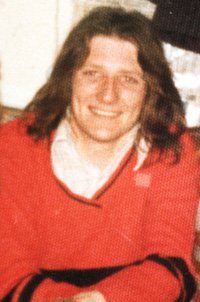The 1981 Irish hunger strike was the culmination of a five-year protest during The Troubles by Irish republican prisoners in Northern Ireland. The protest began as the blanket protest in 1976, when the British government withdrew Special Category Status for convicted paramilitary prisoners. In 1978, after a number of attacks on prisoners leaving their cells to "slop out", the dispute escalated into the dirty protest, where prisoners refused to leave their cells to wash and covered the walls of their cells with excrement. In 1980, seven prisoners participated in the first hunger strike, which ended after 53 days.
(...)
The second hunger strike began on 1 March, when Bobby Sands, the IRA's former Officer Commanding (OC) in the prison, refused food. Unlike the first strike, the prisoners joined one at a time and at staggered intervals, which they believed would arouse maximum public support and exert maximum pressure on Prime Minister Margaret Thatcher.
The republican movement initially struggled to generate public support for the second hunger strike. The Sunday before Sands began his strike, 3,500 people marched through west Belfast; during the first hunger strike four months earlier the marchers had numbered 10,000. Five days into the strike, however, Independent Republican MP for Fermanagh and South Tyrone Frank Maguire died, resulting in a by-election. There was debate among nationalists and republicans regarding who should contest the election: Austin Currie of the Social Democratic and Labour Party expressed an interest, as did Bernadette McAliskey and Maguire's brother Noel. After negotiations, and implied threats to Noel Maguire, they agreed not to split the nationalist vote by contesting the election and Sands stood as an Anti H-Block candidate against Ulster Unionist Party candidate Harry West. Following a high-profile campaign the election took place on 9 April, and Sands was elected to the British House of Commons with 30,492 votes to West's 29,046.
Sands' election victory raised hopes that a settlement could be negotiated, but Thatcher stood firm in refusing to give concessions to the hunger strikers. She stated "We are not prepared to consider special category status for certain groups of people serving sentences for crime. Crime is crime is crime, it is not political". The world's media descended on Belfast, and several intermediaries visited Sands in an attempt to negotiate an end to the hunger strike, including Síle de Valera, granddaughter of Éamon de Valera, Pope John Paul II's personal envoy John Magee, and European Commission of Human Rights officials. With Sands close to death, the government's position remained unchanged, with Secretary of State for Northern Ireland Humphrey Atkins stating "If Mr. Sands persisted in his wish to commit suicide, that was his choice. The Government would not force medical treatment upon him".
On 5 May, Sands died in the prison hospital on the sixty-sixth day of his hunger strike, prompting rioting in nationalist areas of Northern Ireland. Humphrey Atkins issued a statement saying that Sands had committed suicide "under the instructions of those who felt it useful to their cause that he should die". Over 100,000 people lined the route of his funeral, which was conducted with full IRA military honours. Margaret Thatcher showed no regret for his death, telling the House of Commons that, "Mr. Sands was a convicted criminal. He chose to take his own life. It was a choice that his organisation did not allow to many of its victims".
| Name | Paramilitary affiliation | Strike started | Date of death | Length of strike | Reason for imprisonment |
|---|---|---|---|---|---|
| Bobby Sands | IRA | 1 March | 5 May | 66 days | Possession of a handgun |
| Francis Hughes | IRA | 15 March | 12 May | 59 days | Various offences, including the murder of a soldier |
| Raymond McCreesh | IRA | 22 March | 21 May | 61 days | Attempted murder, possession of a rifle, IRA membership |
| Patsy O’Hara | INLA | 22 March | 21 May | 61 days | Possession of a hand grenade |
| Joe McDonnell | IRA | 8 May | 8 July | 61 days | Possession of a firearm |
| Martin Hurson | IRA | 28 May | 13 July | 46 days | Attempted murder, involvement in explosions, IRA membership |
| Kevin Lynch | INLA | 23 May | 1 August | 71 days | Stealing shotguns, taking part in a punishment shooting |
| Kieran Doherty | IRA | 22 May | 2 August | 73 days | Possession of firearms and explosives, hijacking |
| Thomas McElwee | IRA | 8 June | 8 August | 62 days | Manslaughter |
| Michael Devine | INLA | 22 June | 20 August | 60 days | Theft and possession of firearms |








